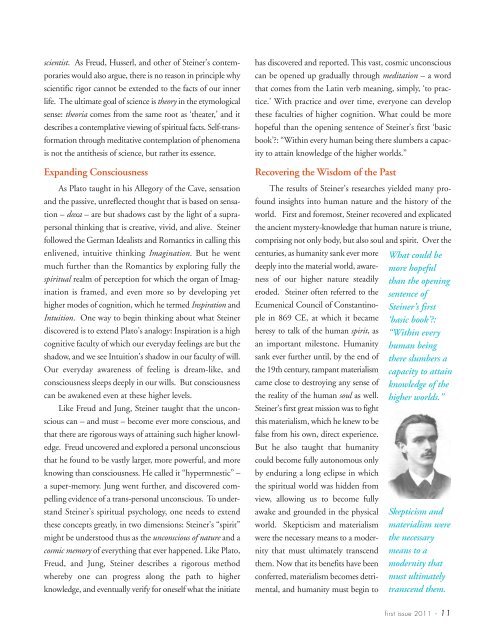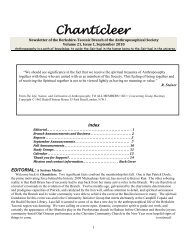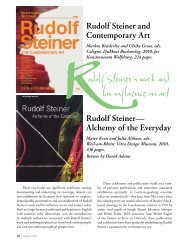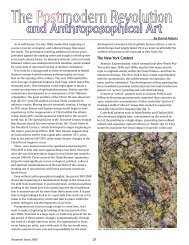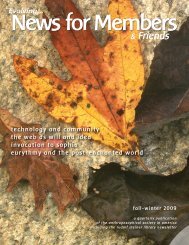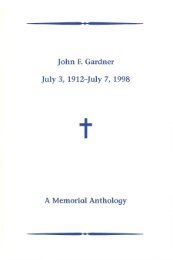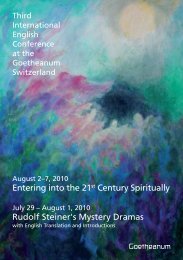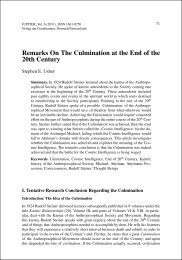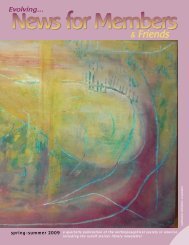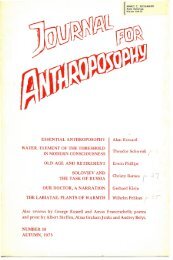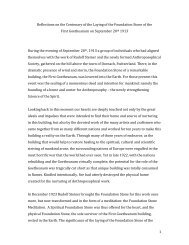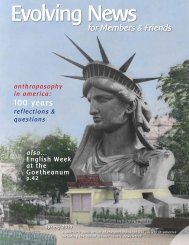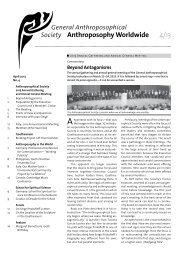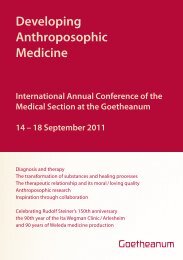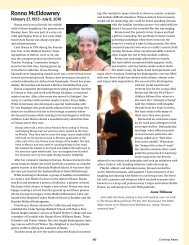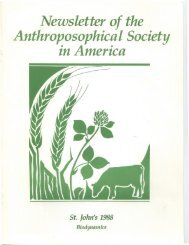Rudolf Steiner's Vision for the Future - Anthroposophical Society in ...
Rudolf Steiner's Vision for the Future - Anthroposophical Society in ...
Rudolf Steiner's Vision for the Future - Anthroposophical Society in ...
You also want an ePaper? Increase the reach of your titles
YUMPU automatically turns print PDFs into web optimized ePapers that Google loves.
scientist. As Freud, Husserl, and o<strong>the</strong>r of Ste<strong>in</strong>er’s contemporaries<br />
would also argue, <strong>the</strong>re is no reason <strong>in</strong> pr<strong>in</strong>ciple why<br />
scientific rigor cannot be extended to <strong>the</strong> facts of our <strong>in</strong>ner<br />
life. The ultimate goal of science is <strong>the</strong>ory <strong>in</strong> <strong>the</strong> etymological<br />
sense: <strong>the</strong>oria comes from <strong>the</strong> same root as ‘<strong>the</strong>ater,’ and it<br />
describes a contemplative view<strong>in</strong>g of spiritual facts. Self-trans<strong>for</strong>mation<br />
through meditative contemplation of phenomena<br />
is not <strong>the</strong> anti<strong>the</strong>sis of science, but ra<strong>the</strong>r its essence.<br />
Expand<strong>in</strong>g Consciousness<br />
As Plato taught <strong>in</strong> his Allegory of <strong>the</strong> Cave, sensation<br />
and <strong>the</strong> passive, unreflected thought that is based on sensation<br />
– doxa – are but shadows cast by <strong>the</strong> light of a suprapersonal<br />
th<strong>in</strong>k<strong>in</strong>g that is creative, vivid, and alive. Ste<strong>in</strong>er<br />
followed <strong>the</strong> German Idealists and Romantics <strong>in</strong> call<strong>in</strong>g this<br />
enlivened, <strong>in</strong>tuitive th<strong>in</strong>k<strong>in</strong>g Imag<strong>in</strong>ation. But he went<br />
much fur<strong>the</strong>r than <strong>the</strong> Romantics by explor<strong>in</strong>g fully <strong>the</strong><br />
spiritual realm of perception <strong>for</strong> which <strong>the</strong> organ of Imag<strong>in</strong>ation<br />
is framed, and even more so by develop<strong>in</strong>g yet<br />
higher modes of cognition, which he termed Inspiration and<br />
Intuition. One way to beg<strong>in</strong> th<strong>in</strong>k<strong>in</strong>g about what Ste<strong>in</strong>er<br />
discovered is to extend Plato’s analogy: Inspiration is a high<br />
cognitive faculty of which our everyday feel<strong>in</strong>gs are but <strong>the</strong><br />
shadow, and we see Intuition’s shadow <strong>in</strong> our faculty of will.<br />
Our everyday awareness of feel<strong>in</strong>g is dream-like, and<br />
consciousness sleeps deeply <strong>in</strong> our wills. But consciousness<br />
can be awakened even at <strong>the</strong>se higher levels.<br />
Like Freud and Jung, Ste<strong>in</strong>er taught that <strong>the</strong> unconscious<br />
can – and must – become ever more conscious, and<br />
that <strong>the</strong>re are rigorous ways of atta<strong>in</strong><strong>in</strong>g such higher knowledge.<br />
Freud uncovered and explored a personal unconscious<br />
that he found to be vastly larger, more powerful, and more<br />
know<strong>in</strong>g than consciousness. He called it “hypermnestic” –<br />
a super-memory. Jung went fur<strong>the</strong>r, and discovered compell<strong>in</strong>g<br />
evidence of a trans-personal unconscious. To understand<br />
Ste<strong>in</strong>er’s spiritual psychology, one needs to extend<br />
<strong>the</strong>se concepts greatly, <strong>in</strong> two dimensions: Ste<strong>in</strong>er’s “spirit”<br />
might be understood thus as <strong>the</strong> unconscious of nature and a<br />
cosmic memory of everyth<strong>in</strong>g that ever happened. Like Plato,<br />
Freud, and Jung, Ste<strong>in</strong>er describes a rigorous method<br />
whereby one can progress along <strong>the</strong> path to higher<br />
knowledge, and eventually verify <strong>for</strong> oneself what <strong>the</strong> <strong>in</strong>itiate<br />
has discovered and reported. This vast, cosmic unconscious<br />
can be opened up gradually through meditation – a word<br />
that comes from <strong>the</strong> Lat<strong>in</strong> verb mean<strong>in</strong>g, simply, ‘to practice.’<br />
With practice and over time, everyone can develop<br />
<strong>the</strong>se faculties of higher cognition. What could be more<br />
hopeful than <strong>the</strong> open<strong>in</strong>g sentence of Ste<strong>in</strong>er’s first ‘basic<br />
book’?: “With<strong>in</strong> every human be<strong>in</strong>g <strong>the</strong>re slumbers a capacity<br />
to atta<strong>in</strong> knowledge of <strong>the</strong> higher worlds.”<br />
Recover<strong>in</strong>g <strong>the</strong> Wisdom of <strong>the</strong> Past<br />
The results of Ste<strong>in</strong>er’s researches yielded many profound<br />
<strong>in</strong>sights <strong>in</strong>to human nature and <strong>the</strong> history of <strong>the</strong><br />
world. First and <strong>for</strong>emost, Ste<strong>in</strong>er recovered and explicated<br />
<strong>the</strong> ancient mystery-knowledge that human nature is triune,<br />
compris<strong>in</strong>g not only body, but also soul and spirit. Over <strong>the</strong><br />
centuries, as humanity sank ever more What could be<br />
deeply <strong>in</strong>to <strong>the</strong> material world, aware- more hopeful<br />
ness of our higher nature steadily than <strong>the</strong> open<strong>in</strong>g<br />
eroded. Ste<strong>in</strong>er often referred to <strong>the</strong> sentence of<br />
Ecumenical Council of Constant<strong>in</strong>o- Ste<strong>in</strong>er’s first<br />
ple <strong>in</strong> 869 CE, at which it became ‘basic book’?:<br />
heresy to talk of <strong>the</strong> human spirit, as “With<strong>in</strong> every<br />
an important milestone. Humanity human be<strong>in</strong>g<br />
sank ever fur<strong>the</strong>r until, by <strong>the</strong> end of <strong>the</strong>re slumbers a<br />
<strong>the</strong> 19th century, rampant materialism capacity to atta<strong>in</strong><br />
came close to destroy<strong>in</strong>g any sense of knowledge of <strong>the</strong><br />
<strong>the</strong> reality of <strong>the</strong> human soul as well. higher worlds.”<br />
Ste<strong>in</strong>er’s first great mission was to fight<br />
this materialism, which he knew to be<br />
false from his own, direct experience.<br />
But he also taught that humanity<br />
could become fully autonomous only<br />
by endur<strong>in</strong>g a long eclipse <strong>in</strong> which<br />
<strong>the</strong> spiritual world was hidden from<br />
view, allow<strong>in</strong>g us to become fully<br />
awake and grounded <strong>in</strong> <strong>the</strong> physical Skepticism and<br />
world. Skepticism and materialism materialism were<br />
were <strong>the</strong> necessary means to a moder- <strong>the</strong> necessary<br />
nity that must ultimately transcend means to a<br />
<strong>the</strong>m. Now that its benefits have been modernity that<br />
conferred, materialism becomes detri- must ultimately<br />
mental, and humanity must beg<strong>in</strong> to transcend <strong>the</strong>m.<br />
first issue 2011 • 11


